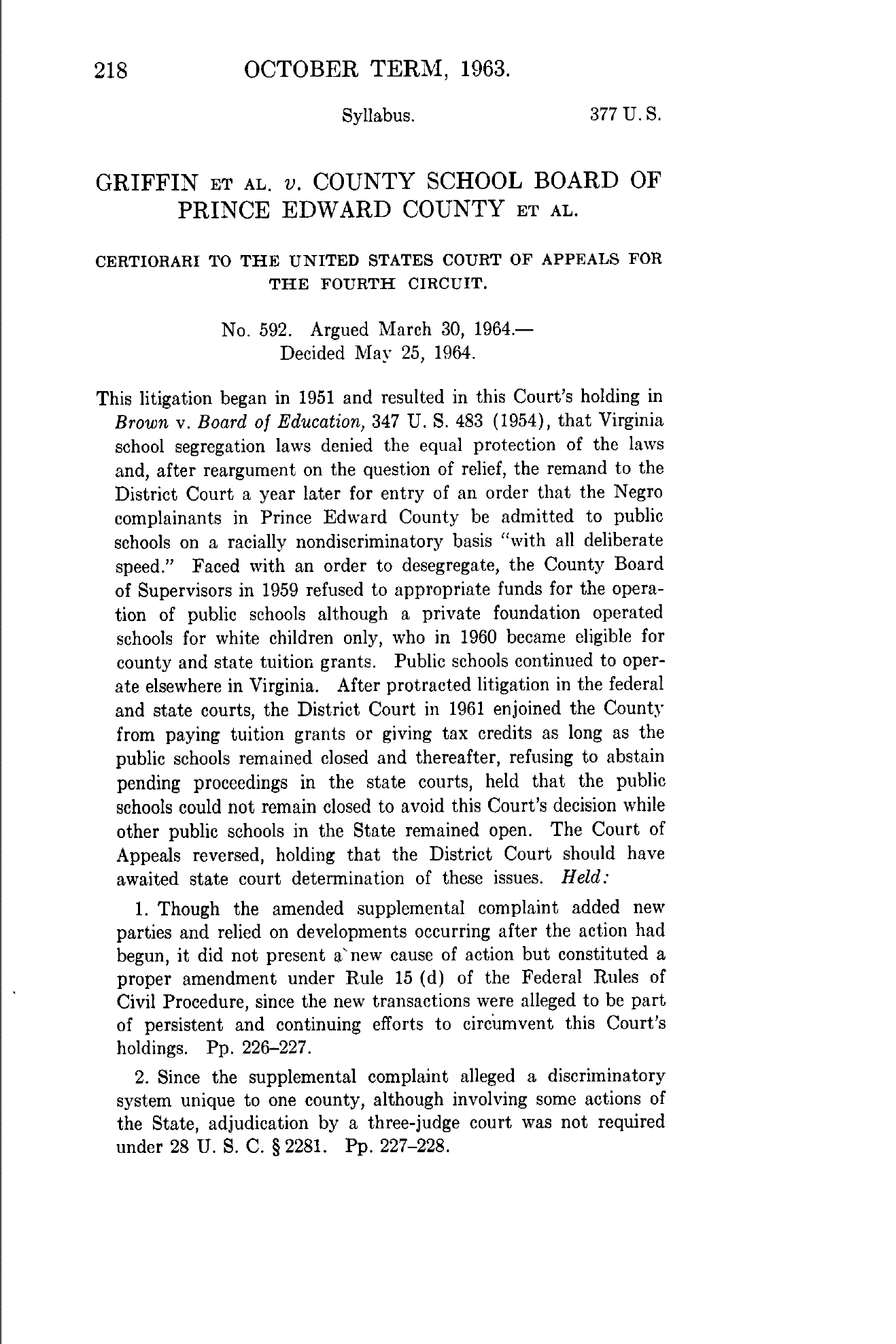RESOURCES
COURT CASES
Griffin v. County School Board of Prince Edward County
1964
Griffin v. County School Board of Prince Edward County (1964) was the culmination of a decade-long legal and political battle over school desegregation, and it directly addressed one of the most egregious cases of resistance to Brown v. Board of Education in the United States. The case arose after Prince Edward County, Virginia, made the radical decision in 1959 to close its entire public school system—rather than comply with a federal court order to integrate its schools—making it the only jurisdiction in the nation to do so. While white students attended newly created private segregation academies, funded indirectly through state tuition grants and tax credits, Black students were left with no access to formal education for five years.
The origins of Griffin lay in the broader Davis v. County School Board case, one of the five consolidated into Brown v. Board in 1954. When the Supreme Court ruled that segregation in public education was unconstitutional, Prince Edward County responded by refusing to appropriate any funds for public education beginning in the 1959–60 school year. This was a deliberate and coordinated move by the county’s Board of Supervisors, strongly supported by the Byrd Organization’s Massive Resistance strategy, to avoid court-ordered integration. While white children attended Prince Edward Academy, founded with private donations and aided by state tuition grants, Black children had few options: some left the county to live with relatives or attend Quaker-supported programs, while others simply went without schooling.
In 1961, a group of African American students and their parents—represented by the NAACP Legal Defense and Educational Fund (LDF), including attorneys Oliver Hill, Spottswood Robinson, and Jack Greenberg—filed a new federal lawsuit in the U.S. District Court for the Eastern District of Virginia. They argued that the county’s refusal to fund public schools, while white students were provided education through private means supported by public funds, violated the Equal Protection Clause of the Fourteenth Amendment. The district court ruled narrowly, asserting that while the closings were discriminatory in effect, they did not rise to the level of a constitutional violation because Virginia did not require counties to operate public schools.
The NAACP appealed, and in 1963, the Fourth Circuit Court of Appeals affirmed the district court’s decision, holding that while the situation was “deplorable,” it did not involve sufficient state action to justify federal intervention. The plaintiffs then appealed to the U.S. Supreme Court, which agreed to hear the case. Oral arguments were presented in 1964, and on May 25, 1964, the Supreme Court issued a unanimous ruling, written by Justice Hugo Black. The Court reversed the lower court, declaring that the county’s decision to close its public schools while supporting private education for whites constituted unconstitutional state action. Justice Black wrote that “the record in this case unmistakably demonstrates the public school system was closed…for the purpose of depriving Negro children of a public school education.”
Griffin v. County School Board of Prince Edward County clarified that governments cannot circumvent constitutional obligations by refusing to act, especially in matters involving fundamental rights like education
The ruling in Griffin v. County School Board ordered Prince Edward County to immediately reopen and fund a public school system on equal terms for all students, ending the five-year school shutdown. This decision significantly expanded the meaning of the Equal Protection Clause and clarified that governments cannot circumvent constitutional obligations by refusing to act, especially in matters involving fundamental rights like education. It also marked the effective collapse of Massive Resistance in Virginia, and it reinforced the authority of federal courts to mandate state compliance with civil rights laws.
